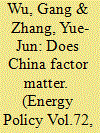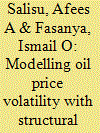| Srl | Item |
| 1 |
ID:
132599


|
|
|
|
|
| Publication |
2014.
|
| Summary/Abstract |
Whether China's crude oil imports are the culprit of oil price volatility these years has not been quantitatively confirmed. Therefore, this paper empirically investigates the role of China's crude oil net imports in Brent price changes from October 2005 to November 2013 based on an econometric analysis. The results indicate that, during the sample period, China's crude oil imports do not significantly affect Brent price changes, no matter in the long run or short run. Therefore, the blame for China's crude oil imports to cause the dramatic fluctuations of international oil price has no solid evidence. Also, there exists significant uni-directional causality running from the Brent price to China×s crude oil imports at the 5% level. Besides, the response of the Brent price to China×s crude oil imports is found positive but slight, and the Brent price responds more significantly to US dollar exchange rate and OECD commercial inventory than to China's crude oil imports in the short run. Finally, the contribution of China×s crude oil imports to Brent price movement is about 10%, which is less than that of US dollar exchange rate but larger than that of Indian crude oil imports or OECD commercial inventory.
|
|
|
|
|
|
|
|
|
|
|
|
|
|
|
|
| 2 |
ID:
191143


|
|
|
|
|
| Summary/Abstract |
This paper explores whether the government's control of refined oil prices can slow down this impact and play a “shock absorber” function. Adopting the SVAR model and divides the sample into two sub-samples according to the level of price regulation, it is found that the degree of price regulation of refined oil is very high before May 2009. At this time, the price regulation seriously hinders economic growth when the oil price falls. After May 2009, the degree of refined oil price control has been greatly reduced, and price control promotes the increase in industrial investment and GDP to a certain extent when oil prices rise and fall, and plays the function of “shock absorber”. In the post epidemic era, in the face of the current geopolitical conflict, it is necessary to continue to implement refined oil price control measures in line with China's situation in the short term, and gradually release oil price control in the long run to form a market price reflecting the relationship between supply and demand. In addition, it is necessary to improve and develop China's crude oil futures market as soon as possible and establish a modern oil circulation system.
|
|
|
|
|
|
|
|
|
|
|
|
|
|
|
|
| 3 |
ID:
117267


|
|
|
|
|
| Publication |
2013.
|
| Summary/Abstract |
In this paper, we provide two main innovations: (i) we analyze oil prices of two prominent markets namely West Texas Intermediate (WTI) and Brent using the two recently developed tests by Narayan and Popp (2010) and Liu and Narayan, 2010 both of which allow for two structural breaks in the data series; and (ii) the latter method is modified to include both symmetric and asymmetric volatility models. We identify two structural breaks that occur in 1990 and 2008 which coincidentally correspond to the Iraqi/Kuwait conflict and the global financial crisis, respectively. We find evidence of persistence and leverage effects in the oil price volatility. While further extensions can be pursued, the consideration of asymmetric effects as well as structural breaks should not be jettisoned when modelling oil price volatility.
|
|
|
|
|
|
|
|
|
|
|
|
|
|
|
|
| 4 |
ID:
171896


|
|
|
|
|
| Summary/Abstract |
In this paper we assess the causal relationship between international crude oil price changes and the RMB exchange rate using daily information from 21 July 2005 to 5 April 2017. In addition to linear causality tests, we employ quantile causality test to identify prior imperceptible causality in quantiles. We find a causal relationship from crude oil price to exchange rate at each quantile interval, but the reverse only appears in tail. This may help to explain why a traditional linear test fails to capture the causality from exchange rate to crude oil price as the quantile causalities in tails are canceled out by each other. Moreover, using RMB as the settlement currency in crude oil trade can weaken the prior significant causal relationships between crude oil price and exchange rate, whereas the reform of exchange rate marketization reignites the tail causalities from exchange rate to crude oil price. These findings recommend a wider use of domestic currencies in crude oil trade to avoid risk from the crude oil market.
|
|
|
|
|
|
|
|
|
|
|
|
|
|
|
|
| 5 |
ID:
168690


|
|
|